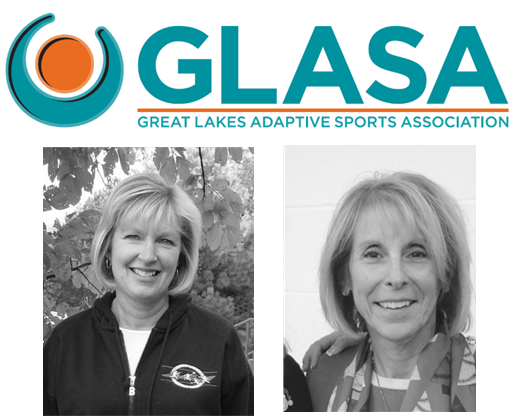Cindy Housner & Cherie Hrosvsky - GLASA

Cindy Housner & Cherie Hrusovsky
GLASA – Great Lakes Adaptive Sports Association
www.glasa.org
Lake Forest/Lake Bluff Chamber: Tell us about GLASA.
Cindy Housner: GLASA -- the Great Lakes Adaptive Sports Association -- was formed in Lake Forest in 1999 as a nonprofit to provide sports and fitness opportunities for children, teens, adults and veterans who have a primary physical or visual disability.
GLASA provides programming year-round on a daily basis for the first-time recreational athletes to the elite Paralympic hopeful. We offer a wide variety of programming in-person throughout Northern Illinois ad Southern Wisconsin. Programs include sled hockey, swim, golf, yoga, ambulatory and wheelchair track and field, wheelchair basketball, wheelchair football, sports camps, clinics, competitions and so much more.
Cherie Hrusovsky: GLASA serves over 1000 unduplicated athletes per year. Prior to COVID-19, GLASA offered 25 in-person programs. GLASA also provides the adaptive sports equipment which can be very expensive. When a person participates in our programs, they don’t have to worry about purchasing a sports wheelchair to participate in wheelchair tennis or wheelchair basketball or that racing chair to compete in GLASA’s track program. These pieces of equipment cost $3500 or more on a average basis. GLASA provides the equipment to keep everyone healthy and active!
Also, I want to point out that Cindy is our founder and serves as our current executive director who began GLASA at her kitchen table 22 years ago!
LFLBC: What was your inspiration for starting GLASA?
Cindy: I had been fortunate to work with athletes with disabilities and saw firsthand the incredible difference that sports had made in their lives. So, I wanted to provide a place where no one was left sitting on the sidelines due to a disability.
LFLBC: What is the one thing you want people to know about GLASA?
Cherie: GLASA is more than just sports. Sport is the vehicle that helps us provide for our athletes—and everyone that participates with GLASA is called an athlete.
Cindy: It’s confidence, independence, friendships, camaraderie, opportunity for travel, education, so much more than sports. We are proud that over the last 6 years, 100% of GLASA’s high school seniors have gone on to college, while students with physical disabilities and mobility impairments represent roughly 7% of the undergraduate student population according to 2019 data.
Cherie: Once people are involved, they find a home at GLASA and we provide a family atmosphere and strong support system which is so important to one’s mental well-being.
LFLBC: How has the Coronavirus crisis affected your organization?
Cherie: The mental health of GLASA athletes has always been important. During this past year, the need to address these challenges has escalated.
Cindy: We provide virtual programming on mental health, wellness and sports specific training for our target population. Eleven hours of virtual offerings are provided each week with topics ranging from ‘What’s Up Wednesdays’ that focuses on topics of interest regarding health and sport to yoga classes. We also deliver the adaptive equipment to homes to help our athletes stay active.
We had been closed for a time early in the pandemic, but then opened in the fall with select programs outdoors which were conducted through early November. In-person practices adapted to doing just drills, no contact activities. Now with Tier 1, we look forward to resuming live programming following all the COVID-19 guidelines.
LFLBC: Do you partner with any local organizations?
Cindy: GLASA is really fortunate to have such wonderful local support, but there are so many groups to mention—I’m hesitant to mention any, as I’m afraid I’m leaving someone out! Here are a few and others can be found on the GLASA website.
Hollister, Pfizer, Northshore University Health System, AdvanTech Plastics, Salvi Schostok and Pritchard and Trustmark are a few of our biggest corporate supporters. A few of our local partners include Kiddles Sports, Lake Forest Bank and Trust, Abbott, AbbVie, Peter Baker and Son Co., Lake Forest College allows us use their facilities and hosts our annual 'The Sleds are Coming' event, Gorton Community Center has been wonderful, as well as the City of Lake Forest. LFHS has been the site of the Great Lakes Games that we host—a 3-day competition with participants from all over the Midwest, including injured veterans. We’ve partnered with Falcons Hockey and the and the high school swim teams and Scout Hockey at the high school, too. The Lake Forest-Lake Bluff Running Club has supported us in so many ways.
LFLBC: How can someone in the community get involved to help your organization?
Cindy: We depend heavily on volunteers. We need volunteer coaches with a specialty in their given sport—as well as general volunteers. Plus, we have volunteer board members, committees, and a young professional’s group, as well. Oh, and we need some volunteer marathon runners this year to run the Chicago Marathon as charity runners!
Cherie: Funding is always crucial -- 91 cents of every dollar we raise goes directly to our athletes and their programs. We have three levels of donors: corporate partners, local business donors and individual giving. Information for volunteering and donations is on our website www.glasa.org.
LFLBC: Is there anything else you’d like to share?
Cindy: The Lake Forest and Lake Bluff communities have been so supportive of our efforts. We’re really thankful for them.
Cherie: We’re hoping to open our doors again in the spring. We’re excited to return to our regular programming when it is safe to do so and we’ll need volunteers and revenue to get back to the same quality of programs that we had pre-Covid. If you’d like to become a donor or a volunteer, we’d love to hear from you!
2.1.2021